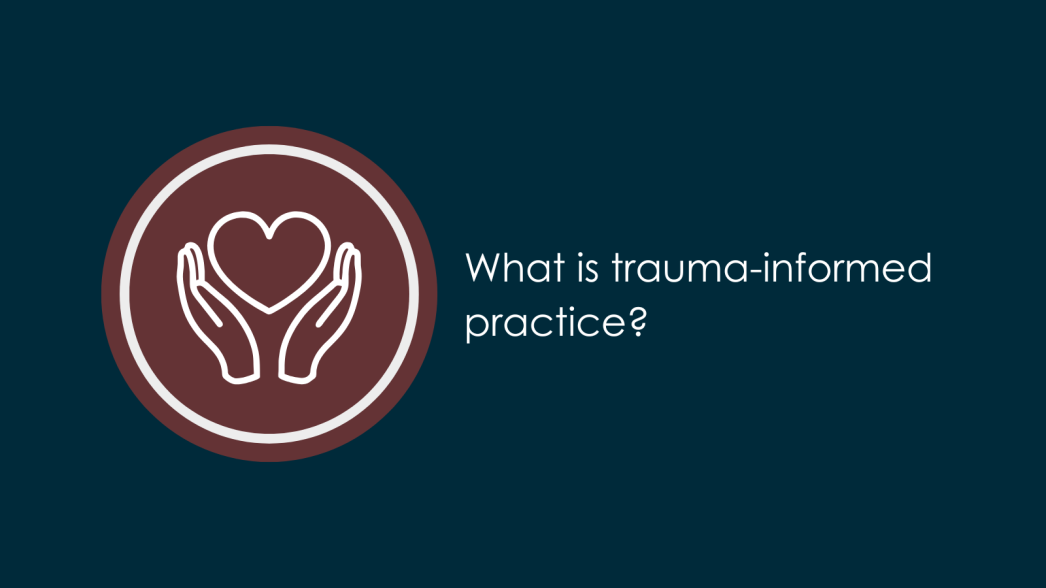Frontline providers play a crucial role in supporting individuals with Fetal Alcohol Spectrum Disorder (FASD). If you are frontline worker that works directly with individuals with FASD, we recommend familiarising yourself with trauma-informed practice. This includes those that work in financial and disability services, FASD networks, housing, shelter and crisis supports and employment programs.
What is trauma-informed practice?
Trauma-informed practice is a way of working that emphasizes safety, trustworthiness, choice, connection, collaboration, strengths and skill building. You do not need to be an expert on trauma or trauma treatment to work in a “trauma-informed way.” Rather, it’s about adapting the way you work to better engage and support people who have experienced trauma.
Trauma can be defined as experiences that overwhelm an individual’s capacity to cope. It can result from an event or series of events that is physically or emotionally harmful and has lasting impacts on an individual’s wellbeing.¹ Trauma affects everyone differently, but it’s important to remember that people can and do heal from trauma.
There are multiple types of trauma:
- Acute – a single event (i.e. violence, assault, death)
- Chronic – multiple events or single type of trauma occurring over time (i.e. intimate partner violence, abuse, war)
- Complex – repetitive, prolonged and accumulative set of traumatic events that often occur at developmentally sensitive or vulnerable time points of life (i.e. adverse childhood experiences, neglect, illness)
- Historic or intergenerational – traumatic events experienced across multiple generations (i.e. effects of colonization, including Residential Schools, Sixties and Millennial Scoops, and ongoing discrimination, racism, and oppression)
Four principles of trauma-informed practice
There are four principles of trauma-informed practice and how they relate to FASD.
1) Trauma awareness
Trauma awareness is about understanding how common trauma is for individuals with FASD. It involves learning how people cope with and survive from trauma; and how it may impact provider’s work with them. For example, the individuals might have difficulties building relationships with their providers. They may also missappointments because of their trauma.
2) Safety and trustworthiness
Safety and trustworthiness is another key principle of trauma-informed practice. Individuals who have experienced trauma may feel unsafe on an ongoing basis. They and their families must feel both physically and emotionally safe when working with a frontline provider.
3) Choice and collaboration
Traumatic experiences can result in individuals feeling powerless. If you give people choices and opportunities for collaboration, you can make them feel empowered without re-traumatizing them.
4) Strengths-based and skill building
The final principal of trauma-informed practice is focusing on an individual’s strengths and skills. You should examine what works for them and learn how to build on what is working.²
Learn more about trauma-informed practice and FASD
We go into much more detail on trauma-informed practice in our FASD for Community and Social Services Professionals Level II online course. The Understanding Grief and Trauma module presents frontline workers with current information about how trauma and grief can impact individuals with FASD, their families and also for themselves as providers.
Trauma-informed practice is not just a set of techniques—it’s a fundamental shift in how we understand and respond to the needs of individuals who have experienced trauma. By recognizing the unique intersection of FASD and trauma, you will better-support the individuals you work with.
References
¹ SAMHSA. Trauma. Clinical Practice 2019 [cited 2019 August 3]; Available from: https://www.integration.samhsa.gov/clinical-practice/trauma.
² BC Mental Health and Substance Use Services and Centre of Excellence for Women’s Health, Trauma-Informed Practice Guidelines. 2013.

